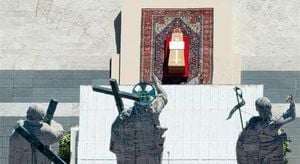Discussions about the city of Volgograd possibly returning to its historical name, Stalingrad, have gained noticeable momentum recently, reflecting shifting attitudes toward Joseph Stalin's legacy. These sentiments were articulated by Vяcheslav Tetekin, the Chief Political Adviser to the Communist Party of the Russian Federation, who highlighted the aim of this initiative and its relevance to modern Russia.
Historically, the name of Stalingrad was changed to Volgograd back in 1961 as part of the Soviet Union’s campaign to denounce Stalin’s cult of personality. This campaign, known as de-Stalinization, was aimed at countering the extensive glorification of Stalin’s leadership during his era, which many have come to view with skepticism over the years. Now, according to Tetekin, there is a considerable revision of how Russians perceive Stalin, with more individuals recognizing his significant contributions to the country.
Tetekin noted, "The relationship to the historical figure of Stalin has substantially changed. More people acknowledge his contribution to the industrialization of the country and the victory in the Great Patriotic War." This viewpoint signifies a notable shift among the Russian population; many now see Stalin's leadership during World War II and his role in building the Soviet Union as positive aspects of his legacy.
Support for the idea of renaming the city back to Stalingrad has increasingly emerged from both public opinion and high-ranking officials. Tetekin emphasized, "The idea of returning the city to the name of Stalin finds support not only among the public but also at the highest levels of government." Such assertions hint at the changing political climate and the possibility of rekindling the Soviet symbols of the past.
One tangible reflection of this shift is the recent decision by President Vladimir Putin to name one of the new icebreakers, which are being constructed to facilitate Arctic exploration, after Stalingrad. This choice not only highlights the government’s embrace of Soviet-era names but also serves as a symbolic gesture aligning with the current narrative of revitalized national pride.
Importantly, the circumstances surrounding this name discussion are intertwined with recent geopolitical events and the global political atmosphere, which could be influencing how Russians reinterpret historical narratives. The idea of renaming Volgograd resonates with nationalist sentiments, particularly during times of international tension, as societies often look back to past victories and heroes for inspiration and unity.
The possible renaming of Volgograd to Stalingrad presents varied emotional responses. For many, it symbolizes resilience and pride as Russia contends with external pressures and strives to consolidate its national identity. Acknowledging Stalin's role, which was once steeped deeply in controversy, now appears to encourage discourse around national identity and historical significance, casting Stalin partly as a ruler whose decisions were pivotal to Russia's emergence as a global power.
Nevertheless, there remain critics who voice concern over re-establishing Stalin’s name through public institutions. Such fear highlights the tensions between collective memory and historical narrative, prompting discussions about what values society chooses to endorse going forward.
While the outcomes of these discussions remain uncertain, the enthusiasm for potentially resurrecting the Stalingrad name indicates not just nostalgia but also increasingly assertive nationalistic tendencies within Russian society. The campaign for Stalingrad's return is emblematic of greater socio-political trends at play, where historical interpretations shape contemporary identity.
Looking toward the future, it will be intriguing to observe how the conversation about the name change evolves and what ramifications it may hold for public sentiment and state policy. The dialogue surrounding Volgograd’s identity reflects broader themes of remembrance, reconciliation, and national pride—critical foundations upon which Russia continues to build its modern narrative.



